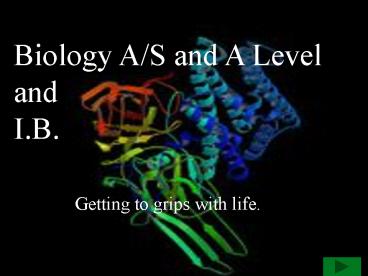Biology AS and A Level and - PowerPoint PPT Presentation
1 / 18
Title:
Biology AS and A Level and
Description:
There are 6 core topics covered at SL and 11 at HL and then a choice of 2 options. ... Data collection and processing. Conclusion and evaluation ... – PowerPoint PPT presentation
Number of Views:243
Avg rating:3.0/5.0
Title: Biology AS and A Level and
1
Biology A/S and A Leveland I.B.
Getting to grips with life.
2
Getting to grips with life.
- Biological Molecules.
- Physiological processes.
- Interactions within and between organisms.
- Modifying life processes.
- Our effect on the Biosphere.
3
Why Study Biology?
- You enjoy it.
- You are interested.
- You are good at it.
- You will need it for further education courses.
- You will need it for your future career.
4
What careers use biology?
Medicine Dentistry Clinical science
Physiological measurement Pharmaceutical
industry Radiography and radiotherapy. Teaching
and lecturing Laboratory support Educational
resources Psychology Sport and fitness
training Health and safety. Ambulance service
Nursing Physiotherapy Dietetics Podiatry
Occupational therapy. Floristry Commercial
growing Horticulture research Horticulture
retailing Landscaping and amenity horticulture
Groundsmanship Water quality control Water for
recreation Fish farming Fisheries inspection
and research Forestry Countryside for leisure.
Animal husbandry Farm management Veterinary
science Agricultural product testing
Agricultural engineering Agricultural sales and
marketing Information science Journalism
Publishing Broadcasting Film and video Museum
work Science promotion Ecology Environmental
protection Waste management Nature
conservation Environmental health Town and
country planning Brewing Food quality assurance
Food product development Catering technology
Pest control Food and drink retailing Genetics
research, Clinical cytogenetics, Molecular
cytogenetics, Counselling.
5
Will I enjoy it?
- Do you ask how organisms work?
- Do you ask why organisms are the way they are?
- Can you make links between different areas of
Biology? - Can you do practical work and handle equipment
carefully? - Are you prepared to develop your understanding
beyond the specification?
6
The I.B. learner profile
- Inquirers
- Knowledgeable
- Thinkers
- Communicators
- Principled
- Open-minded Caring
- Risk-takers
- Balanced
- Reflective
- These are characteristics that you will need to
develop whether you study the A level or I.B.
7
Am I any good at Biology?
- You should be aiming for A or A at GCSE level.
- If in doubt talk to your teacher and discuss
their recommendations. - You dont need to study Chemistry at A level but
it will help with your understanding of the
Biochemistry. - You will also need good basic Maths skills.
8
How hard will I have to work?
- Biology is NOT an easy science.
- It ranks with Chemistry, Physics and Maths as one
of the hardest A levels to achieve good grades
in. - You are expected to spend time over and above
homework doing study (up to 9 hours a fortnight
private study).This will include reading ahead
of the lessons and around the subject
9
What results should I expect?
- Very good ones!!
- Last year students at AS achieved 85 As Bs
- Last year students at A2 achieved 86 As Bs
10
A level OCR Biology Course Structure
11
Assessment of A/S and A2
12
I.B. Biology
- Biology will be offered at both Standard level
(SL) and Higher level (HL). - Standard level classes will have 5 hours per
fortnight - Higher level classes will have 8 hours teaching
per fortnight
13
The nature of I.B Biology
- 4 basic Biological concepts run through both the
Higher and standard level course. - Structure and function
- Universality Versus Diversity
- Equilibrium within systems
- Evolution
14
The structure of the course
- There are 6 core topics covered at SL and 11 at
HL and then a choice of 2 options. - As well as general theory work all students will
have to undertake logged practical work.This
will include 30 hours at SL and 50 Hours at HL (1
lesson a fortnight for SL and 1 a week for HL). - All students must also complete a project along
with other students from other group 4 subjects
on a specific topic. These will be carried out on
2 enrichment days (10 hours in total).
15
The I.B course at CCHS
16
Assessment of the I.B. course
- A 2 year course assessed at the end of year 13.
There are no unit examinations. - External assessment
- Standard level
- Paper 1 ( 20) multiple choice on core
- Paper 2 (32) data response and extended response
on the core - Paper 3 (24) short answer questions from the
options - Internal practical assessment (24)
- Higher level
- Paper 1 (20) multiple choice on core
- Paper 2 (36) data response and short answers on
core, extended response on core and options. - Paper 3 (20) short answer and extended response
on options
17
Assessment of the I.B. course
- Internal assessment (24)
- There are 5 assessment criteria for practical
work - Design
- Data collection and processing
- Conclusion and evaluation
- Manipulative skills (Summative at end of course)
- Personal skills (Group 4 project)
18
Any Questions?

